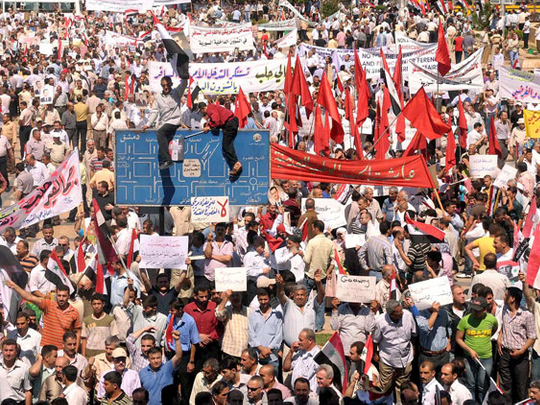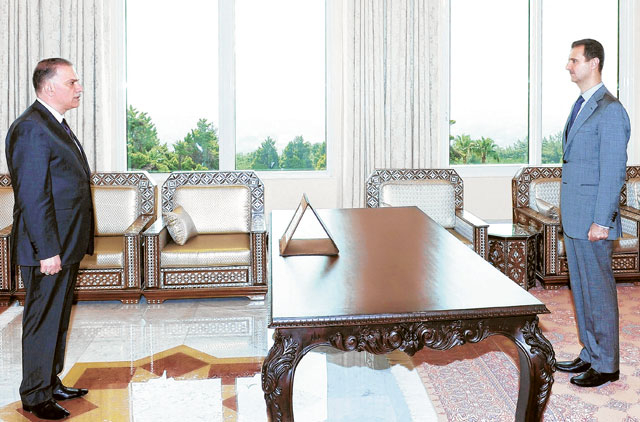
Amman: Syrian forces killed at least one civilian and injured 20 in Homs on Monday during the heaviest raids on the city since troops deployed there two months ago to crush dissent against President Bashar Al Assad, residents said.
The armour and tank-backed assaults on Homs, Syria's third largest city and hometown of Assad's wife Asma, came a day after the authorities held a "national dialogue" meeting boycotted by the opposition, who described it as lacking credibility.
"Military raids and house to house arrests have become routine after protests, but this time they did not stop shooting all night in the main neighbourhoods," said a resident of the Bab Sbaa district, a lecturer who gave his name as Iyad.
Among hundreds of people arrested in Homs last week was Jalal al-Najjar, a prominent neurosurgeon, he added.
The Syrian Observatory for Human Rights said armoured vehicles fired machineguns on densely populated neighbourhoods in Homs overnight and arrested several people.
In the city of Hama, 50 km to the north, security forces mounted house to house arrests and shooting was heard, but there were no immediate reports of casualties, activists said.
Human rights campaigners say hundreds of Syrians of all walks of life are being arrested across the country every week, adding to the more than 12,000 political prisoners in Syrian jails.
Syria has barred most independent media from operating inside the country making it difficult to verify accounts by activists and authorities.
In the last few days, security forces have arrested leading theatre director Osama Ghanem in Damascus, 24-year-old journalist Omar al-Assad in the Jaramana suburb of the capital and veterinarian Abdelghani Khamis in Hama, they added.
Shooting was heard across Hama overnight as security forces and gunmen loyal to Assad kept up raids on the city after killing up to 30 people last week. A large protest against Assad's rule took place in the centre of Hama on Friday, as the U.S. and French ambassadors visited the city in a gesture of international support.
National Dialogue
The demonstrations have been spreading since the 45-year-old president ordered tanks into numerous cities and towns where protests have seen the biggest turnouts in a campaign that has killed at least 1,400 civilians since the uprising erupted in March, according to human rights groups.
Under international pressure, including loss of support from his once enthusiastic ally Turkey, Assad has used a mix of military assaults and promises of reform to try to placate protesters and shore up support for his family, which has ruled the country of 20 million for the last 41 years.
His vice president, Farouq al-Shara, whose role is ceremonial, opened a "national dialogue" meeting on Monday, which was mostly attended by supporters of Assad.
Shara said the authorities will open a "new page", hinting at allowing political parties, other than the ruling Baath Party, to operate.
Opposition figures, who boycotted the two-day conference, said any reform would remain on paper as long as the security apparatus and Assad's loyalists continued to operate with impunity, using repression to try to stop demonstrations and arresting or shooting peaceful opponents.
Assad, from Syria's Alawite minority sect, an offshoot of Islam, retains support from Iran and from Lebanon's Hezbollah, although the strengthening of alliances with regional Shi'ite powers have created disquiet among Syria's Sunni population, helping to fuel protests.
Demonstrations in Sunni rural areas and the less mixed cities, such as Homs and Hama, have been the biggest, with a heavy security presence focused on preventing demonstrations in the capital Damascus and in the merchant hub of Aleppo.
Human Rights Watch said in a report this week that security personnel it had interviewed "described receiving, and following, orders to shoot on protesters to disperse them".
"The testimony of these defectors provides further evidence that the killing of protesters was no accident but a result of a deliberate policy by senior figures in Syria to use deadly force to disperse protesters," said Sarah Leah Whitson, Middle East director at Human Rights Watch.













